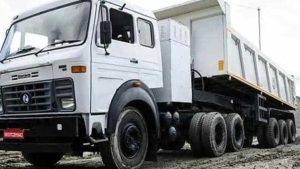Electric freight trucks will have economic and environmental benefit for India: study
-
According to the study, electric trucks can eventually become carbon neutral if charged with renewable energy, particularly solar energy when its production is highest
Advancements in battery technology and costs, combined with the right policies and incentives, can make electric truck operations more affordable, and India can become a world leader in producing EVs.
According to a new study by the Department of Energy’s Lawrence Berkeley National Laboratory and UCLA, diesel-fueled freight trucks play an outsized role in producing India’s total greenhouse gas and air pollution emissions. The country has promoted policies to transition to electric vehicles for public transportation buses and cars, batteries that can power such large trucks have been too heavy and expensive to make their electrification possible.
“With the right policies and incentives, battery electric trucks would be more affordable to operate than diesel, and India can become a world leader in producing electric vehicles. The transition would also help India reduce its reliance on imported oil, improve the air quality, and meet the goal of net zero greenhouse gas emissions by 2070,” it said.

India imports 88% of the oil it uses and of the total petroleum consumed by the country’s transport sector, nearly 60% is used by freight trucks. The trucks are responsible for 71% of the carbon dioxide emissions, 74% of the particulate matter emissions, and 55% of the nitrogen oxide emissions from road vehicles.
“Electric trucks will be instrumental in enhancing India’s energy security and reducing the goods transport cost. Additionally, for any decarbonization and air pollution control strategy for the country, electric trucks are critical,” said Nikit Abhyankar, Berkeley Lab research scientist.
Battery electric trucks make better financial sense for all truck types. At the current battery price, a 25-ton electric truck, the most commonly used long-haul truck size in India, with a 569-kilowatt-hour battery pack and 400-kilometer operational range can deliver a 28% lower total cost of ownership per kilometer than a diesel truck, the study said.
The researchers also found that based on India’s current grid emissions, electric trucks will reduce greenhouse gas emissions 9% to 35% per kilometer compared with diesel trucks.
According to the study, electric trucks can eventually become carbon neutral if charged with renewable energy, particularly solar energy when its production is highest.
Indian government will need to promote policies to increase battery manufacturing, electric vehicle manufacturing and uptake and to support building a fast-charging infrastructure, the research suggested.
“India has embarked on very ambitious electrification policies prior to this. We find that the time is now ripe to put targeted policies on trucking.” said Deepak Rajagopal, faculty scientist at Berkeley Lab and UCLA.
Read More At-https://bit.ly/3TEbeZL




Recent Comments